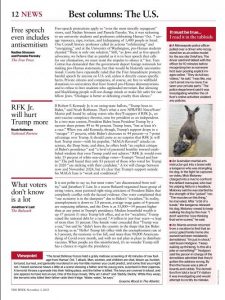
“It ain’t what you don’t know that gets you into trouble. It’s what you know for sure that just ain’t so.”
—Mark Twain
- Jonathan V. Last about how most voters are “disconnected from reality”;
- How Google’s Pixel phone could destroy humanity;
- Tom Nichols about why we shouldn’t care about what people in diners believe.
Here’s an item I saw in this week’s issue of The Week. The link to the article here, alas, won’t work for you unless you’re a subscriber and log in. But you can view the screen capture of the page in question. And I’ll quote the item, below.
The Week, Nov. 3rd issue: Best Columns: The U.S., summary of a column by Jonathan V. Last in The Bulwark [which I couldn’t find on its site].
It is not polite to say so, but most voters “are disconnected from reality,” said Jonathan V. Last. In a recent Bulwark-organized focus group of swing voters, most parroted right-wing criticisms of President Biden that completely conflict with the factual evidence. One voter complained that “our economy is in the dumpster” due to Biden’s “socialism.” In reality, unemployment is down to 3.8 percent, average wage gains of 4 percent are outpacing inflation, and the Dow is at 33,000—14 percent higher than at any point in Trump’s presidency. Median household wealth is up 37 percent (!) since Trump left office, and as for “socialism,” Trump raised the national debt by a record 7.4 trillion in just four years—a leap of more than 33 percent. One female voter conceded that “Trump was a nut,” but said he “didn’t leave the country in the shape that Joe Biden is leaving us in.” Hello? Trump left office with the unemployment rate at 6.3 percent, the economy in free fall, and more than 90,000 Americans dying of Covid every month, and with no real plan in place to distribute vaccines. When people are this misinformed, it’s no wonder Trump still has a chance to regain the presidency.
Where do these people get their news? One guess. Or maybe two. Fox News, and social media.
In passing, it’s worth noting that the vast bulk of content on the fact-checking sites like PolitiFact are claims on social media, or from Republican news sources or politicians. (Today there’s an item about Facebook posts claiming “Every President we ever had in the United States of America was a draconian reptilian.” There are apparently who actually believe such things; they are unhinged from reality.) Every hundred posts or so, they challenge a Democratic politician about exaggerating, but never about Trump-style outright lying.
\\
And how would a smartphone be about things that aren’t true, much less destroying humanity?
Washington Post, Matt Bai, 31 Oct 2023: Opinion | Google Pixel’s ad campaign is destroying humanity
Because, as we’ve seen in commercials for some time now, you can *edit* your photos to remove unwanted distractions. Now, you can edit out sounds too, or move sections of a photo around to, say, exaggerate how high you can jump. This is perfect for trolls promoting conspiracy theories. Very soon we will be unable to believe anything we see online. (And we already know that people are notoriously poor eye-witnesses.)
…the Pixel’s advanced artificial-intelligence tools enable you to creatively edit your photos as never before. If you want to muddy the line between truth and invention in your Instagram feed, this is the phone for you.
In one picture, a dancer makes himself appear larger and higher in the air than he actually is. In another, a group of friends merge different photos to give them each brighter smiles. A couple of skateboarders are shown eliminating an inconvenient picnic table from a shot by drawing a circle around it and making it disappear, as if by magic.
The message here is unmistakable. Don’t be a prisoner to unsatisfying reality. Just make it whatever you want it to be.
Our society continues to struggle with the dawn of a new age of misinformation — deepfakes, digital impostors, foreign bots. But here’s Google, making it not only easy but also glamorous to clandestinely alter the moments of your life and share them with all your friends.
Our politics reels from a crisis of self-certainty, in which entire communities believe what they want to believe and disregard any evidence to the contrary. No worries! Here’s Google to help you wall yourself off in a world of conspiracy and make-believe, where the only memories worth keeping are the ones that present the world as you’d like it to be rather than as it is.
What will become real? Anything anyone wants to “believe” in. That’s already been true for many, for a long time. And maybe it doesn’t matter for many. As I’ve discussed before.
\\\
This piece echoes the first item above. Most people form opinions without having any understanding of what they are talking about. (And I don’t think it’s because they’re stupid, exactly; it’s because the world is an increasingly complex place, and no one person can keep informed about everything. The issue, perhaps, is that people feel the need to have opinions, nonetheless. Politics forces them to.)

Tom Nichols, The Atlantic, 30 Oct 2023: Stop Asking Americans in Diners About Foreign Aid, subtitled “Instead, keep explaining it.” Secondary sub-title: “Persistent Foreign-Aid Myths”
The opening concerns a Washington Post reporter talking to people about Mike Johnson, the new House speaker, in his home district. “God did it” was one response. Nichols (I reviewed one of his books here) quotes from the WaPo item:
“People really do look at the funding we’re sending to Israel and Ukraine and say, ‘I can’t afford to go to Kroger,’” Gauthier said as she sat amid the lunchtime crowd, some of whom she said had stopped buying beverages because of the cost. “A lot of these customers know Mike Johnson and think we often get overlooked and maybe we won’t anymore,” she said.
To which Nichols responds:
I’m not sure what it means to be “overlooked” in a cherry-red district in a state where, as the Post notes, Republicans will control all three branches of state government once the conservative governor-elect is sworn in, but the comment about foreign aid is a classic expression of how little people understand about the subject.
And then Nichols cuts to the chase.
Let’s review some important realities.
First, foreign aid is about 1 percent of the U.S. budget, roughly $60 billion. Special appropriations to Ukraine have, over the course of 18 months, added up to about $75 billion, including both humanitarian aid and weapons. Israel—a far smaller country that has, over the past 70 years, cumulatively received more foreign aid from the United States than from any other country—usually gets about $3 billion, but Joe Biden now wants to add about $14 billion to that.
That’s a lot of money. To put it in perspective, however, Americans forked over about $181 billion annually on snacks, and $115 billion for beer last year. (They also shell out about $7 billion annually just for potato chips. The snack spending is increasing, perhaps because Americans now spend about $30 billion on legal marijuana every year.) Americans also ante up a few bucks here and there on legal sports gambling, and by “a few” I mean more than $220 billion over the past five years.
Lesson: ordinary people don’t know much about anything. The world is too complex for everyone to keep up with and have informed opinions. And yet those ordinary uninformed people drive politics. Is there a solution? Should there be?







